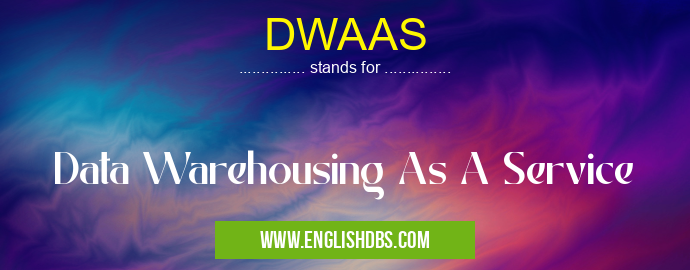What does DWAAS mean in UNCLASSIFIED
DWAAS (Data Warehousing As A Service) is a cloud-based service that provides data warehousing capabilities to organizations without the need for them to build and maintain their own data warehouse infrastructure. DWAAS platforms offer a range of features and services, including data ingestion, data storage, data processing, and data analysis.

DWAAS meaning in Unclassified in Miscellaneous
DWAAS mostly used in an acronym Unclassified in Category Miscellaneous that means Data Warehousing As A Service
Shorthand: DWAAS,
Full Form: Data Warehousing As A Service
For more information of "Data Warehousing As A Service", see the section below.
Benefits of DWAAS
- Reduced costs: DWAAS eliminates the need for organizations to invest in hardware, software, and IT staff to manage their own data warehouse.
- Scalability: DWAAS platforms can easily scale up or down to meet the changing data needs of organizations.
- Flexibility: DWAAS platforms offer a range of features and services that can be tailored to the specific needs of organizations.
- Security: DWAAS platforms provide robust security measures to protect data from unauthorized access.
- Ease of use: DWAAS platforms are designed to be easy to use, even for organizations with limited data warehousing expertise.
How DWAAS Works
DWAAS platforms typically work by providing organizations with a set of APIs that they can use to connect their data sources to the DWAAS platform. Once the data is ingested into the DWAAS platform, it is stored in a secure and scalable data warehouse. Organizations can then use the DWAAS platform to process and analyze their data using a variety of tools and techniques.
Essential Questions and Answers on Data Warehousing As A Service in "MISCELLANEOUS»UNFILED"
What is Data Warehousing as a Service (DWAAS)?
DWAAS is a cloud-based service that provides businesses with the infrastructure and tools necessary to build and manage data warehouses.
What are the benefits of using DWAAS?
DWAAS offers several benefits, including:
- Reduced infrastructure costs
- Improved data security
- Increased scalability
- Enhanced data analytics capabilities
Who can benefit from DWAAS?
DWAAS is suitable for businesses of all sizes and industries that need to store and analyze large amounts of data.
How does DWAAS work?
DWAAS typically involves the following steps:
- Data ingestion: Data is collected from various sources and loaded into the data warehouse.
- Data transformation: Data is cleaned, standardized, and transformed to make it suitable for analysis.
- Data storage: Data is stored in the data warehouse in a structured and efficient manner.
- Data analysis: Data is analyzed to extract insights and make informed decisions.
What are the different types of DWAAS solutions?
There are two main types of DWAAS solutions:
- Managed DWAAS: The service provider manages all aspects of the data warehouse, including infrastructure, data management, and security.
- Self-managed DWAAS: The business manages some or all aspects of the data warehouse, while the service provider provides underlying infrastructure and tools.
How to choose the right DWAAS provider?
When choosing a DWAAS provider, consider the following factors:
- Scalability and performance
- Data security and compliance
- Cost and pricing
- Customer support and experience
Final Words: DWAAS is a valuable solution for organizations that need to manage and analyze their data without the need to invest in their own data warehouse infrastructure. DWAAS platforms offer a range of benefits, including reduced costs, scalability, flexibility, security, and ease of use.
